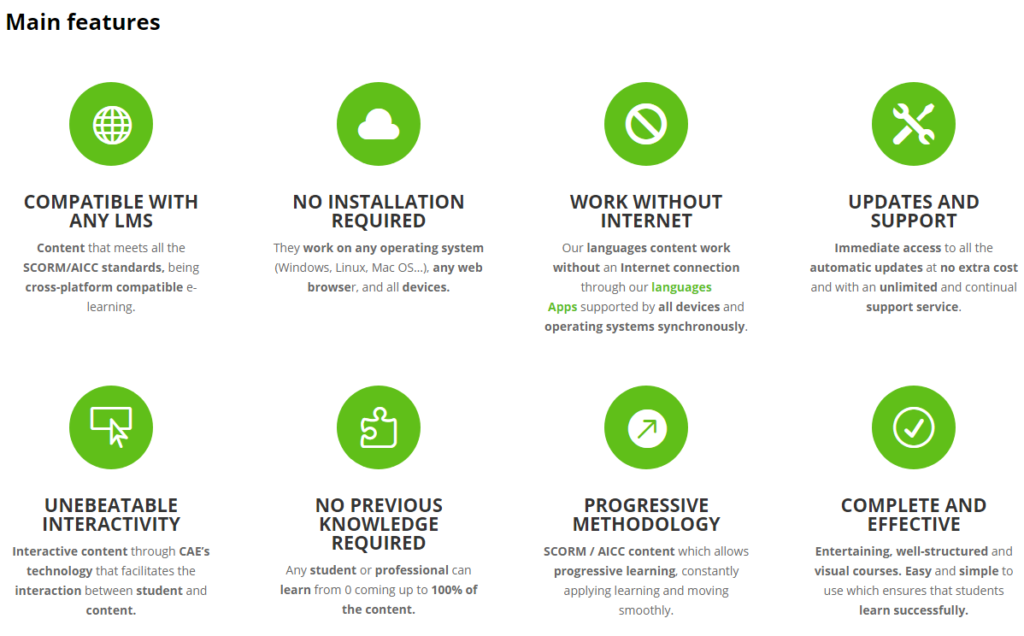The world of business in which we currently live is very globalized and culturally diverse. Therefore, languages are an essential strategic skill in any corporation.
Due to this fact, institutions and corporations are turning to corporate licenses for language courses and SCORM content for integration in their educational platform.
If you work with distribution or consulting on training for businesses and organizations, and wish to offer the best elearning solutions, you must make your clients understand that selecting the correct educational platform and quality language content for businesses is essential for achieving success.
One way of making the importance of online language learning for institutions or corporations understood is to demonstrate the advantages that the integration of e-learning technology for languages may have for their corporation:
#1. Quality company:
Today, a company may be measured by the training courses that it offers its employees, therefore the content that it teaches or distributes must be of a high quality to allow it to remain in an increasingly competitive market. On occasions, price has been more important than quality, and this has been noted in the long term, especially in large corporations where excellence and low rotation of staff is sought.
#2. Effective method for employees:
The combination of structured and progressive learning methods, and practice with the most advanced technology make this teaching a creative and effective method for any individual. Lessons include 100% interactive exercises, without gaps in learning, through which the user will progress practically and effectively in the different linguistic skills. The online chat and internal messaging connect both classmates in different parts of the world, and native speaker teachers to answer their queries in real time, allowing interaction and relationships between international classmates.
#3. Cost savings:
New technologies entail cost savings in the implementation of e-learning strategies. There may be a significant initial outlay, but its profitability will start to be seen soon – up to 80% compared with more classic methods. Dispensing with presential teaching, the expense of contracting classrooms is avoided, as well as travel, meal allowances, accommodation and materials. There is also a guarantee that in all centers of the corporation the same training, of the same quality, is received.
#4. Flexibility and adaptation:
Teaching any presential training in the professional field has its limitations and complications. Conversely, virtual training allows teaching from any place and at any time. Furthermore, it allows adaptation to the level of knowledge of each student, which is complicated in presential group classes, where there are usually differences in levels between students.
There are multiple-device services that work in synchronization from an app on any device, allowing progress and use to be monitored easily from the Human Resources department.
#5. No travel:
By contracting an online language training project, companies do not need their personnel to travel, with the time that this entails. The student will not need to go to a center, and a teacher will not have to travel to offices to teach the classes.
Furthermore, if the company has several offices in different locations, this method allows training to be provided to all employees, regardless of where they are located.
When planning or contracting training, more clients may be reached, as distance training between the different operational centers of the corporation has multiple advantages.
#6. No need for a physical space:
In online training the corporation capitalizes and takes advantages of their resources to the maximum. It does not require a place for teaching the courses. Each employee can learn the language they wish from their own desk, or even from home.
#7. Continuous monitoring of the training of employees:
Online language courses for institutions allow continuous monitoring in real time or what each employee is doing and learning, to thereby monitor the use of the training.
#8. Update and exhaustive monitoring of training:
Online language training projects are usually provided on an LMS platform (Learning Management System) or virtual campus, providing those in charge of the training with monitoring of information of all participants, in addition to potential changes to the lessons, materials, corrections, and other basic aspects of the learning process.
#9. Maximum concentration:
Learning at the time and in the place that each student wishes is the best way to make the most of each moment when they feel most receptive. This greatly facilitates the concentration of employees when they begin the course, as it is them who has decided to begin.
As can be seen, language courses are a very valuable resource that companies should adopt. Don’t leave online language training courses out of your range of educational software solutions. Discover the most effective solutions to offer in businesses and corporations.
You may also be interested in:
- How to Choose Language Training that Suits Your Company
- Why Corporate English is Vital for Companies Who Want to Grow
- Choosing the Best eLearning Solutions Partner for Your Company
OTHER TRAINING OF INTEREST
Click here for information on our catalogue of online training courses.



